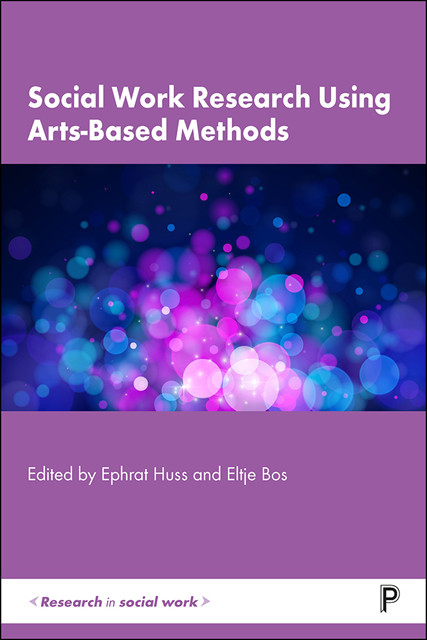Book contents
- Frontmatter
- Dedication
- Contents
- List of figures and tables
- Notes on contributors
- Introduction
- Section I Arts-based research as a method to understand and give voice to marginalised groups
- Section II Using arts-based research to listen to, and give voice to, children in social work
- Section III Arts-based research as a way for researchers and community members to understand communities
- Epilogue
- Index
4 - Autoethnographic playwriting and performance for self-healing and advocacy
Published online by Cambridge University Press: 13 October 2022
- Frontmatter
- Dedication
- Contents
- List of figures and tables
- Notes on contributors
- Introduction
- Section I Arts-based research as a method to understand and give voice to marginalised groups
- Section II Using arts-based research to listen to, and give voice to, children in social work
- Section III Arts-based research as a way for researchers and community members to understand communities
- Epilogue
- Index
Summary
Introduction
This chapter focuses on how autoethnographic playwriting and performance can be used as research pursuits in social work. It lays out (1) a rationale for using playwriting and performance as a research method to engage in self-healing and to advance social change; (2) a case study including theoretical approach, research procedures, and dissemination; and (3) a discussion for future social work research and practice. Autoethnographic playwriting and performance provides a tool that researchers can use to explore the experiences of research participants.
Autoethnographic playwriting and performance as research
As a research method, autoethnography developed in the late 1990s (Ellis et al., 2011). As a more sophisticated method of postmodern social science, autoethnography became in the 2000s as ‘the study, representation, or knowledge of a culture by one or more of its members’ (Buzard, 2003, p. 61). Autoethnography has since become a confessional form of inquiry in which researchers embrace the realities of their lives while they deconstruct reality, power, and identities (Adams & Holman Jones, 2011, p. 108). Autoethnography has provided a space in the human sciences where the ‘human’ is of central interest and where the ethnographic method is the vehicle for writing stories, for excavating the past, for envisioning the future, and for investigating life in its totality (Bochner & Ellis, 2016).
The exploration of the self in playwriting and performance was solidly developed in the second half of the twentieth century, and it then took hold in the past 20 years alongside reality shows, YouTube, Facebook, and Instagram – all forms of expression that not only allow for but call for the exposure of the self in the public space (Pendzick et al., 2016). Autoethnographic playwriting and performance are investigational pursuits that echo experimental theatre, whose main focus is more on the process of acting than on the actual outcomes, be it the written play or the performance (Emunah, 2020).
The method of ‘self-revelatory performance’ was described by Emunah in 1983 (Emunah, 2015). For this chapter, self-revelatory performance is a genre of experimental theatre that encourages the actor/ethnographer to explore themselves and their process to find a relationship with the audience before, during, and after the performance.
- Type
- Chapter
- Information
- Social Work Research Using Arts-Based Methods , pp. 45 - 54Publisher: Bristol University PressPrint publication year: 2022

